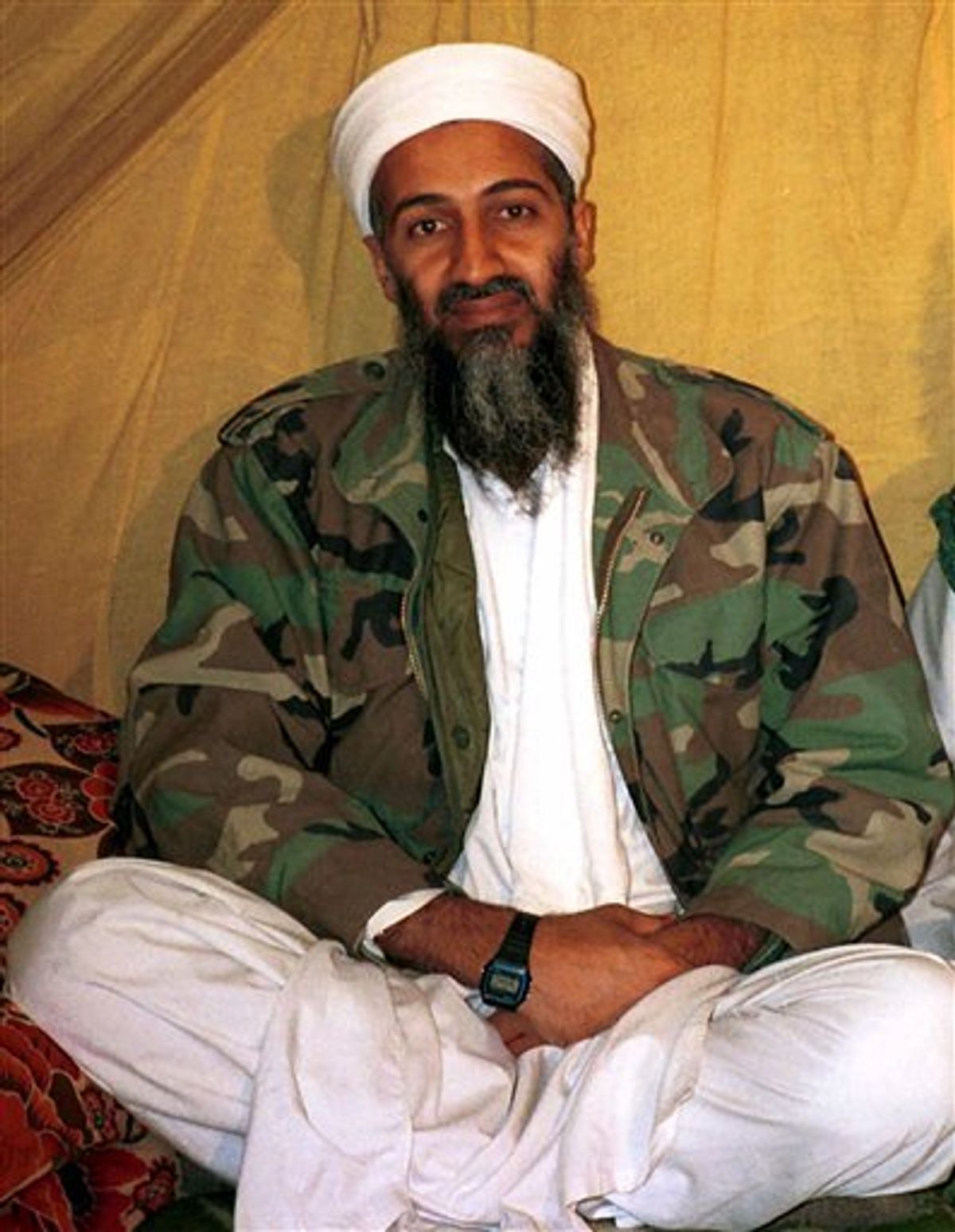The world is expected to get its first glimpse at Osama bin Laden's daily life as the world's most wanted terrorist Saturday with the disclosure of home videos showing him strolling the grounds of the fortified compound that kept him safe for years.
The footage shot at the terror leader's hideout in Abbottabad, Pakistan, and propaganda tapes made there, are expected to be released to the news media Saturday, U.S. officials said.
They are among the wealth of information collected during the U.S. raid that killed bin Laden and four others. The information suggests bin Laden played a strong role in planning and directing attacks by al-Qaida and its affiliates in Yemen and Somalia, two senior officials said.
And it further demonstrates to the U.S. that top al-Qaida commanders and other key insurgents are scattered throughout Pakistan, not just in the rugged border areas, and are being supported and given sanctuary by Pakistanis.
Despite protests from Pakistan, defeating al-Qaida and taking out its senior leaders in Pakistan remains a top U.S. priority. That campaign will not be swayed by Islamabad's complaints that the raid violated the country's sovereignty, a senior defense official said Friday.
The officials spoke on condition of anonymity to discuss sensitive material.
Their comments underscore U.S. resolve to pursue terror leaders in Pakistan, particularly during this critical period in the Afghanistan war, as President Barack Obama moves to fulfill his promise to begin withdrawing troops this July.
Already the Afghan Taliban has warned that bin Laden's death will only boost morale of insurgents battling the U.S. and its NATO allies. Al-Qaida itself vowed revenge, confirming bin Laden's death for the first time but saying that Americans' "happiness will turn to sadness."
For its part, the U.S. has already launched at least one drone strike into Pakistan in the days since bin Laden was killed, and there is no suggestion those will be curtailed at all.
The strikes are largely carried out by pilotless CIA drones, and the expectation is that they will continue in the coming days as U.S. military and intelligence officials try to take quick advantage of the data they swept up in the raid before insurgents have a chance to change plans or locations.
The raid on bin Laden's compound deep inside the Pakistan border has further eroded already strained relations between Washington and Islamabad, and angry Pakistani officials have said they want the U.S. to reduce its military presence in their country. The Pakistani army, while acknowledging it failed to find bin Laden, said it would review cooperation with the U.S. if there is another similar attack.
Pakistani officials have denied sheltering bin Laden, and they have criticized the U.S. operation as a violation of their country's sovereignty.
But a senior defense official said recent protests by Islamabad about the raid will not stop the U.S. from moving against terror leaders that threaten American security.
Obama has made it clear that the U.S. will take action wherever necessary to root out al-Qaida, which has declared war on the United States and has been using Pakistan as a base to plot and direct attacks from there and other insurgent locations around the world.
The official also said there are no plans to scale back U.S. training of the Pakistani frontier corps and army. But the decision is up to Pakistan.
U.S. administration leaders have been careful not to directly accuse the Pakistani government of being complicit in the existence of sanctuaries that have cloaked bin Laden and his lieutenants. But U.S. lawmakers say it strains credibility that the most wanted man in the world could have been in living in a major suburb, one that's home to Pakistan's military academy, without someone knowing it.
CIA director Leon Panetta told lawmakers that "Pakistan was involved or incompetent," according to a U.S. official, who recounted to conversation on condition of anonymity to discuss the closed-door briefing.
Counterterrorism officials have debated how big a role bin Laden and core al-Qaida leaders were playing in the attacks launched by affiliated terror groups, particularly al-Qaida in the Arabian Peninsula, which is based in Yemen, and al-Shabab in Somalia.
Information gathered in the compound, officials said, suggests that bin Laden was much more involved in directing al-Qaida personnel and operations than some analysts thought over the last decade. And it suggests bin Laden was "giving strategic direction" to al-Qaida affiliates in Somalia and Yemen, the defense official said.
Officials say they have already learned a great deal from bin Laden's cache of computers and data, but they would not confirm reports that it yielded clues to the whereabouts of al-Qaida deputy Ayman al-Zawahri.
Al-Zawahri is a leading candidate to take bin Laden's place as the leader of the terror group.
Obama met on Friday with the U.S. commandos who killed bin Laden after a decade-long search.
"Job well done," the president declared, addressing roughly 2,000 troops after meeting privately with the full assault team -- Army helicopter pilots and Navy SEAL commandos -- who executed the dangerous raid. Their identities are kept secret.



Shares